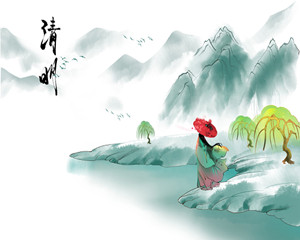《清明》是北宋诗人黄庭坚在清明节时触景生情而创作的一首诗。诗中运用了很多对比,首联是“桃李欢笑”对“坟墓生愁”;颔联是“动物蛰伏”对“草木生长”;颈联是“无耻的乞食人”对比“忠贞的隐士”,对比鲜明,引发人的思考;尾联诗人抒发感慨,无论是贤者还是愚人,最后都是黄土盖身。诗人将大自然中的勃勃生机与人世间不可逃脱的死亡命运进行对照,表现出了消极虚无的思想,抒发了诗人对人生无常的慨叹和对社会不平的愤激。

黄庭坚·《清明》
佳节清明桃李笑,野田荒冢只生愁。
雷惊天地龙蛇蛰,雨足郊原草木柔。
人乞祭余骄妾妇,士甘焚死不公候。
贤愚千载知谁是?满眼蓬蒿共一丘。
On the Day of Pure Brightness
Huang Tingjian
Peaches and plums are blooming with simile on the Pure Brightness Day,
Desolate land and deserted sepulcher are presenting merely melancholy.
Spring thunder's claps shake dangerous and snakes awake,
And ample rainfall turns grass and trees green and supple.
People brag shamelessly about their false acquaintance with the nobles,
While some others prefer to die rather than to be entitled as noble.
Merciless time shows that be noble or humble men die alike,
And are buried in the same mass grave site.
(崔文凯 译)
更多精品翻译素材,敬请关注可可英语。












